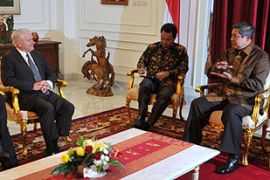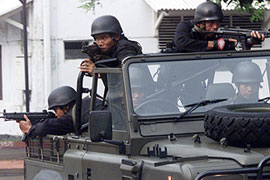US to lift ban on Indonesia forces
Ties to resume with elite Kopassus unit after 12-year ban over alleged rights abuses lifted.

“As a result of Indonesian military reform over the past decade … and recent actions taken by the ministry of defence to address human rights issues, the United States will begin measured and gradual programs of security co-operation activities with the Indonesian Army Special Forces,” Gates said at a news conference.
“This initial step will take place within the limit of US law and does not signal any lessening of the importance we place on human rights and accountability.”
Ensuring reform
Kopassus was accused of major abuses through the 1990s in the provinces of Papua and Aceh and in East Timor, a former province that has since gained independence.
International rights groups have said members of Kopassus were linked to the disappearance of student activists in 1997 and 1998 and were never held accountable.
 |
| Rights groups say Kopassus members have been linked to missing activists [EPA] |
The US cut ties with the military unit under a 1997 law that banned US training for foreign military units accused of human rights violations.
Two years later, Washington severed all ties with the Indonesian military after troops rampaged through East Timor when it voted to secede from Indonesia.
The US lifted that overall ban in 2005 but kept its restrictions against Kopassus.
But Indonesia’s president pledged on Thursday that there would be no more rights abuses by the Indonesian military.
“I’ll guard the Indonesian military reform and ensure that what happened 10 or 20 years ago will not happen again,” Yudhoyono was quoted as saying by Purnomo Yusgiantoro, his defence minister, at the meeting with Gates.
Rights groups sceptical
However, rights groups have criticised the lifting of the ban, saying they are sceptical that the elite unit will be held accountable for past alleged abuses or will reform enough to prevent future abuse.
Usman Hamid, director of the human rights group, Kontras, in Jakarta, said the new US policy should have been implemented after the Indonesian government fulfilled its promise to bring to justice those responsible for rights violations.
“The US must ensure that first there are some policies taken by Indonesian authorities,” he told Al Jazeera.
“One is to remove all human rights violators from Kopassus and the armed forces.
|
“It’s hard to see the administration’s decision as anything other than a victory for abusive militaries worldwide” Sophie Richardson, Asia advocacy director, Human Rights Watch |
“Secondly is to prosecute those responsible for the crimes and thirdly is to put soldiers from Kopassus and all the armed forces soldiers under civilian jurisdiction.”
Meanwhile, US-based Human Rights Watch said the decision undermined the slight progress Indonesia’s military has made.
Sophie Richardson, the group’s Asia advocacy director, said in a statement that the US was disregarding the problems that will persist in implementing reforms and accountability.
“The Indonesian justice system rarely vigorously investigates or prosecutes anyone from the military, so forces like Kopassus will likely still be able to commit abuses with impunity and still meet the Obama administration’s standards,” she said.
“It’s hard to see the administration’s decision as anything other than a victory for abusive militaries worldwide.”